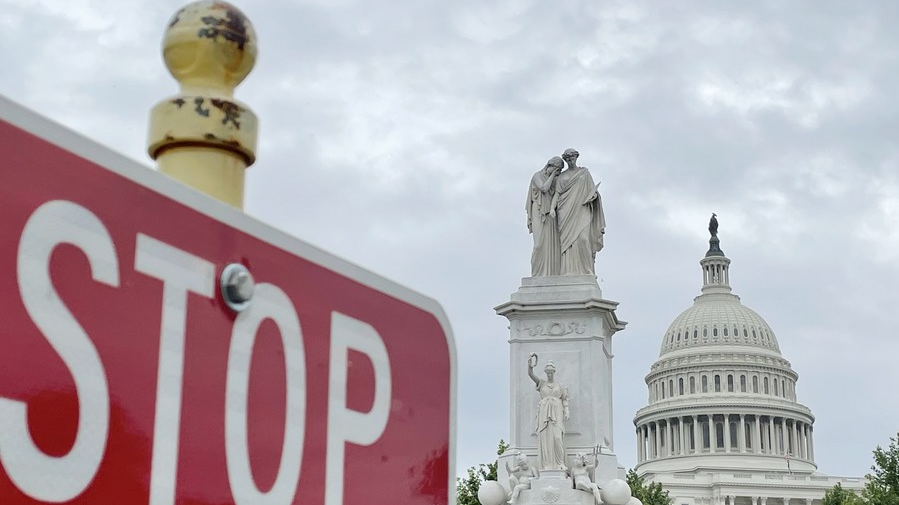
The U.S. Capitol building behind a traffic sign in Washington, D.C., the United States, May 28, 2021. /Xinhua
The U.S. Capitol building behind a traffic sign in Washington, D.C., the United States, May 28, 2021. /Xinhua
Editor's note: Abu Naser Al Farabi is a Dhaka-based columnist and analyst focusing on international politics, especially Asian affairs. The article reflects the author's opinions and not necessarily those of CGTN.
In an interview with Politico magazine, National Aeronautics and Space Administration (NASA) Administrator Bill Nelson, while ringing fearmongering alarms over China's lunar exploration ambitions, warned that Beijing could establish a foothold and try to dominate the most resource-rich locations on the lunar surface – or even keep the U.S. out. His hawkish comments came on the heels of a recent Pentagon report to Congress highlighting a series of recent leaps for the Chinese space program. Fomenting the hoax of the "China threat" by U.S. officials with that level of professional esteem over Beijing's normal, legitimate and peaceful outer space endeavors is not something noble.
By the same token, Nina Armagno, director of staff of the U.S. Space Force, made a similar scaremongering remarks in November last year during his visit to Australia. Hyping a near-apocalyptic threat over whatever China does or aspires to do is a part of Washington's broader agenda to undermine China's ascendance. Outer space is just a relatively recent domain added to that greater nefarious effort as China has over the years made significant strides in its space exploration program.
While in strategic competition, a nation may voice skepticism and worry about the actions of its adversary in the conflicting arenas. Of course, such worries should be backed up by factual explanations and empirical evidence. But due to the persistent demonization of China and the Chinese system by corporate media moguls and political elites, America's public discourse – while manufactured and manipulated – and its bipartisan political energy – driven by entrenched interests – have reached a toxic level.
Thanks to carefully choreographed political efforts, the so-called security threat from China to the United States has gradually turned into a pathological belief and a commonly held assumption, despite unambiguous evidence to the contrary. Since everybody knows, nobody really considers or questions the veracity of the rhetorical saber-rattling. In such a setting, even one like Nelson or Armagno with a high level of technical knowledge and heuristic capacity cannot but float them into the deluge of delusional belief. They have either lost political sway or dare not walk against the overwhelming political energy.
Renowned Russian author Leo Tolstoy wrote that even the most intelligent people "can very seldom discern even the simplest and most obvious truth if it be such as to oblige them to admit the falsity of conclusions they have formed, perhaps with much difficulty – conclusions of which they are proud, which they have taught to others, and on which they have built their lives." Simply put, once one has established an idea, especially one that is linked to their worldview, they tenaciously hold onto that viewpoint even when the facts speak to its wrongheadedness.

U.S. soldiers are seen during a ceremony at Barker Field, in Pyeongtaek, South Korea, July 2, 2021. /CFP
U.S. soldiers are seen during a ceremony at Barker Field, in Pyeongtaek, South Korea, July 2, 2021. /CFP
Concerning the American worldview, central are the two core beliefs: one about the nature of the world and the other about the part that America ought to play in it. First, there is a pervasive, deeply-embedded, visceral understanding that the world is hazardous. Second, a significant portion of Americans thinks that U.S. activities or the stabilizing influence of the U.S. forward military presence are the primary causes of any peace and tranquility. To the American policy establishment, the world is a nest of vipers, in other words, that is kept quiet – to the extent that it is – only by the American policeman.
In the first case, the belief in the inherent dangers of the outside world has deep historical roots in the United States. Even, the end of the Cold War which America arguably emerged victorious and led to its "unipolar moment" could not change its national psyche entrenched by external geopolitical fear. During the Cold War, people did not need to know much about communism to believe that it was antithetical to U.S. values, for example.
America is in another great-power competition with China – that many argue is a "new cold war." We are witnessing the same Cold War mentality on the part of the U.S. – fomenting the danger over China's ascendance without explaining how. It is a well-calibrated grand scheme to demonize its strategic rival, China, on one hand, and to brandish self-righteousness on the other. Thus, geopolitical fear, now emanating from losing its hegemonic primacy, prevents current international empirical realities from receiving a fair evaluation by U.S. elite society.
And in the second case, America's hubristic belief in its indispensability is in great part attributed to its short-lived era of post-Cold War "unipolar moment." American political elites cannot consume the truth that the American primacy-centric prism through which they have long been used to perceive and interpret their surroundings is by far obsolete.
Taking America's vast resources, intellectual capacity, and global standing into account, its role is vital to the world but not the hegemony. The age of "hegemonic stability" to which the United States has long been oversubscribed is over. Time has passed for the West, America in particular, to call the shots at their whims.
(If you want to contribute and have specific expertise, please contact us at opinions@cgtn.com. Follow @thouse_opinions on Twitter to discover the latest commentaries on CGTN Opinion Section.)